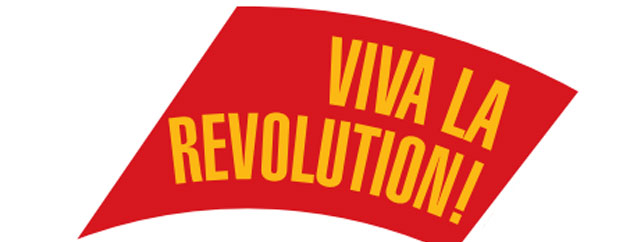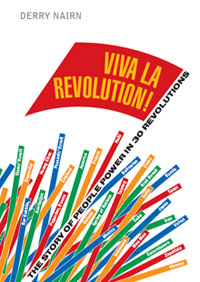
Viva La Revolution! by Derry Nairn
08 February, 2012The problem in celebrating revolution is that its fruits are often elusive, often worse than the system they’ve replaced and frequently little but a painful and largely imperceptible staging post on the route to something better. In Viva La Revolution! Derry Nairn examines 30 revolutions – from the slave rebellion of Spartacus (the Third Servile War 73-71BC) to the events of the Arab Spring – and shows how historical examples of “people power” have influenced and continue to influence social and political change.
Quicker than you can say, “Che Guevara fashion accessories”, revolutions may turn from hope to dismay but however bad they get the twin imperatives of freedom and justice are at work continually stoking and modifying the political process. The good news for humanity – which this book imparts – is that a desire for freedom and justice seem to be inviolable.
Party animals
Remember, a revolution is for succeeding generations and not just for Christmas. That’s true whether it is good or bad news. The one constant in the space-time political continuum, is regrettably, it is never too late to go backwards, as Nairn shows. When it is bad and mired in a dialectic-free zone as evinced by the Russian Revolution, you are left weighing up the merits of serfdom versus a system presided over by the Party, the local Soviet and the NKVD, which is maximum serfdom with added surveillance, incarceration, forced migration, extra-judicial murder, brainwashing, etc. As Nairn points out, revolution often serves up “a workers’ paradise” which is so appalling is has to be overthrown – as in Poland – by a workers’ revolt (Solidarity).
The rational deficit
The galling thing about revolution and social democracy is the disjuncture between words and deeds. The result of the Arab Spring will be the most recent litmus test of how accurately revolution reflects the popular will.
Nairn serves up the revolutionary “tapas” but it does little more than whet the appetite. It is not his fault. Humanity always struggles to do persuasion, reason, right and rationality when faced with power, privilege and patronage, and it is difficult to fit all this into 270 pages. Revolutions are messy businesses which don’t in themselves necessarily confer better – even in the short-term. Part of the reason for this is that power is seldom devolved to the wider population through instruments of governance. Were it otherwise, why revolt?
Business as usual
Nairn’s book is an interesting primer for further study but can be brief with regards to some revolutions. Much is made of historically vague revolts – such as those of Spartacus and various Japanese and Chinese Jim Jones-style characters without the Kool-Aid – whose causes are impaired by the partial nature of all history and temporary tipping points based more on expediency than on any higher calling. Many revolutions – as you would assume – start as mercantile-led reactions against distant tax and excise raising authorities. They always involve an elite and they only go so far. The distance they travel remarkably mirrors the interest of those elites whether they reside in the Thirteen Colonies or among the various creole fiefs of the Spanish empire.
Whoops!
The book has some glaring and silly mistakes, with the research appearing slovenly in parts. The Phillipines is referred to as a seperate entity from Spain at a time when it was clearly part of the Spanish Empire (under the Spanish-American War of 1898); the fact that US imperialist tendencies started with the idea of manifest destiny, wholesale confiscation and the Monroe Doctrine (1823) is not acknowledged; there is talk of barbarian hordes from Thrace when the evidence is clear that Roman hegemony was threatened primarily by a westward migration which pushed through Central Europe (Goths, Visigoths, Vandals, Huns, etc.). Then there is the mysterious “King Assad” – the prevailing tyrant of Syria who really should be referred to as President Assad, and the land tenure system in the Basque Country which is described as “latifundia” (large estates) when it is characterised by “minifundia” (small estates).
The polis versus mercantilism
The most interesting sections of the book concern the French and American revolutions, due to their effect in changing the nature of political governance and their statements on the rights of man (non-slaves only need apply). Similarly, from a modern standpoint, is the quasi-revolution in Argentina (2001-2002) – less a revolution than the realisation that the IMF is an instrument of stasis and not a listening bank. In the latter example, the idea that the polis can force a government’s hand and get it to renege on punitive interest payments for the sake of national well-being is one that may be revisited in the euro crisis.
You can have any party you like as long as it doesn’t represent your interests
 Whether this book does justice to the subject matter is a moot point. Its premise is that political and social processes are not and cannot be fixed. Change is an integral and immutable part of any system whatever its political complexion. Nairn illustrates this with the case of the self-immolation of Tunisian Mohamed Bouazizi, whose death was the catalyst for the Arab Spring.
Whether this book does justice to the subject matter is a moot point. Its premise is that political and social processes are not and cannot be fixed. Change is an integral and immutable part of any system whatever its political complexion. Nairn illustrates this with the case of the self-immolation of Tunisian Mohamed Bouazizi, whose death was the catalyst for the Arab Spring.
Nairn also shows that revolution can be a tipping point both to enlightenment and a journey into the heart of darkness. It is an enjoyable read – shortcomings aside – because it illustrates how ideas gain currency, change the debate and infuse the political process long into the future. There is no better example in this respect than the Thomas Paine-inspired US constitution and the ideas that underpinned the French Revolution. Any book that jogs you into thinking a little more about how politics work and how prescient Hegel is can’t be all bad.
Viva La Revolution! The Story of People Power in 30 Revolutions is published by Elliott & Thompson. It’s available to buy from Amazon as a Hardback and eBook
Follow Sounds and Colours: Facebook / Twitter / Instagram / Mixcloud / Soundcloud / Bandcamp
Subscribe to the Sounds and Colours Newsletter for regular updates, news and competitions bringing the best of Latin American culture direct to your Inbox.

